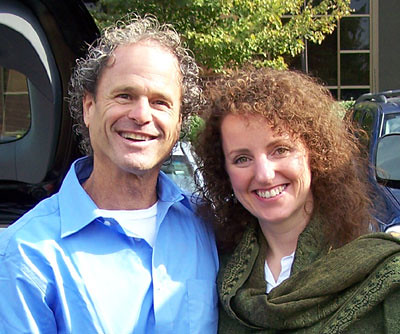
Short post today... We're currently dealing w with a pesky kitchen drain issue that's wreaking havoc in our household. Fortunately, a very talented and power-tool-weilding local plumber just fixed the problem. In the process, he seems to have applied those power tools to our bank account -- $175 for less than one hour's work!? (Ouch!) And the kicker is that the current state of our kitchen is "absolutely atrocious."? I'm serious... we're at like DefCon 5 in terms of the disastrous nature of that room -- and as you well know, for a raw household, that's probably 10 times more frustrating than it is for others. (I smell a whole post coming soon on this topic ...)
Today, we mainly just wanted to say that, at the end of our post yesterday, we briefly asked what you would like to see more of here at Pure Jeevan. We have received some great comments and emails in return, and have decided to devote tomorrow's post to responding to / addressing some of the suggestions we received. So, if you have any further thoughts to share about raw foods content you'd like to see more or less of, please let us know either by commenting below, or by email. Wendi is at WendiDee [at] Pure Jeevan.com. Jim is at Rawdiant [at] gmail.com.
I had to write an update after my grocery shopping today! Remember I said just yesterday that sometimes people comment about the amount of produce we are buying? Well, a sweet older woman saw all of the bananas going into our cart and she asked, "What are you going to do with all of those bananas " You already know the response I gave: "Eat them!"

One of the really nice workers at the food co op commented that he can eat about eleven bananas sometimes. I told him, and another friend we saw shopping at the same time, that I can do that now, too. I explained how I used to get full on just one banana when I ate cooked foods. But, now that my system is so much cleaner and healthier, I can consume 10-11 bananas in a day (bananas should be covered with brown specks to truly be ripe and digestable). I don't remember the maximum I ever ate in a day--it's somewhere in my Going Raw journal, I'm sure. It might have even been more than 10 or 11 when I was going through my major banana-eating phase. Now I eat about 4-6 bananas a day, which doesn't seem like a lot to me (but in the past I would have wondered about all of those bananas in someone's cart, too!).
Read more: What are you going to do with all of those bananas?

Wow, who knew there would be so much to post here on this blog about Wendi an KDcat's 2010 tour ! Today is March 15, which officially marks the beginning of the second half of the trip -- and we're still talking about Portland! ? Since Portland, Wendi and Kdcat have had adventures in Grants Pass, Santa Rosa, San Francisco, San Luis Obispo, and as I write this there are two more angels in the City of Angels.
But, in the interest of keeping our coverage chronoligical, we'll continue where we left off last week -- Portland! Story, pics, and video all appear below!
Read more: W&K Select Portland as New Pure Jeevan Home, Head South for Further Adventures
There's SO much to celebrate lately! Check it out:
 Our dear friend Robin (aka Rawbin) celebrates her birthday today. We created a fun video for Rawbin, who has the ability to make anyone laugh! Rawbin blogs here and you can read her "My Raw Story" installment here.She's also the east coast Raw Spirit Festival representative. (RSF east happens August 29-30, 2009 in Maryland. More info here.)
Our dear friend Robin (aka Rawbin) celebrates her birthday today. We created a fun video for Rawbin, who has the ability to make anyone laugh! Rawbin blogs here and you can read her "My Raw Story" installment here.She's also the east coast Raw Spirit Festival representative. (RSF east happens August 29-30, 2009 in Maryland. More info here.)

Jim here... Wow, did you read yesterday's post ? Wendi is away for a month starting today. That's like a year in Internet time, right?
So, I guess I have the blog to myself for a while. So strange... I mean, I helped her set it up back in late '07, contributed numerous articles and a lot of behind-the-scenes time along the way, and then got really involved here (regularly -- daily, even) about a year ago. But, I never "had the keys" all to myself for a long spell. I feel as though I've been entrusted with something important, you know ? I must control that strange compulsion within me to, you know, run a silly cat video or something. But, I'll resist and keep things on-point. (LOL)
 Wow, I'm having a tough time keeping up with our fearless travelers! I thought I'd break their San Francisco adventures up into FOUR smaller posts made from Wendi's personal travelogue. I'll try to address everything they did chronoligically. There will be a video in this posts, videos in the next post, and a picture set at the end! Here's what she had to say about their first stop in Frisco:
Wow, I'm having a tough time keeping up with our fearless travelers! I thought I'd break their San Francisco adventures up into FOUR smaller posts made from Wendi's personal travelogue. I'll try to address everything they did chronoligically. There will be a video in this posts, videos in the next post, and a picture set at the end! Here's what she had to say about their first stop in Frisco:
For our San Francisco/Berkeley visit, we first met up with a college friend, Pete Guinosso, at Cafe Gratitude. It was fun catching up, and Pete treated KDcat and I to our meals. While at the table, I labeled Pete as the "Quote Man" because he had a fantastic book of quotes he has been collecting. He periodically read from it as our conversations brought specific quotes to mind. It was a beautiful collection of poems, which Pete said is his second book and is filling up quickly.
Cafe Gratitude lived up to its reputation of having a great vibe with pleasant servers and fantastic raw foods. I wondered, however, why there isn't a dish called "I am Love." (There is a drink called "I am Loved," but I was interested in one that claimed I AM Love. Maybe they'll come up with one for my next visit!) After leaving Cafe Gratitude, I have to admit I wasn't overly grateful to find a $40 parking ticket waiting on the rental car. OUCH! We kept the car parked there (since it was already ticketed), and Pete showed us around the Berkeley shopping area. It was a fun stroll on a beautiful sunny, California day.

"My biggest problems are starches... I grew up with them so they are emotional comfort foods."
Well, it's great that you already understand that your desire for starches is mostly coming from an emotional connection with those foods. You're already much more aware of your body and its cravings than many others who are trying to lose weight.
If you have a strong connection with starches, then go ahead and eat them in the beginning of your journey to better health. Simply start by adding more and more fresh, raw, water-rich fruits and vegetables. The more you consume healthy fruits and vegetables, the more your body will begin to crave them (no kidding!! You will actually one day crave a salad as much as you're craving starches right now!).

I was reminded about a video I saw some time ago, after seeing a similar video on my dear friend Bunny's blog. What you are about to see is AMAZING!!
Take the time to meet...

I met Dr. Doug Graham in person at the Raw Spirit Festival. He has a soft, gentle voice but his message is anything but soft. He's straight-forward about diet and health being intimately related. Dr. D. invited me to be his guest this past Saturday at a doctors' convention where he boldly stated to his audience of doctors: "I'm probably not going to make you all that happy with the things I'm going to tell you."
There he was, standing in front of a room of doctors who have taken an oath to harm none. These doctors were there to learn about health and nutrition, but I don't think they had any idea about what they were going to learn from Dr. D. "What I say may fly in the face of what you've been taught," Dr. D. admitted. Many of the doctors leaned forward a bit, eyes and ears a bit more open at the thought of hearing something radical.

We have something special for today s Makin? It Monday! Remember Terilynn, the brilliant chef behind The Daily Raw Caf , whom we introduced you to not long ago? Well, this weekend she posted a recipe challenge open to anyone willing to participate. We here at Pure Jeevan are always up for an adventure, so thanks for the challenge, Terilynn!
The rules were simple: Use the list of possible ingredients, create a raw vegan food dish, and send pictures and information about your dish to The Daily Raw Caf . Here s the list for the challenge, with the items we didn t have available crossed out:
***** DISCLAIMER: As with all of our posts here at Pure Jeevan, and particularly those coming up over the next week and a half (which will all be tagged with a new term, "Nadi Balance,"), please refer to the disclaimer that runs at the bottom of all Pure Jeevan Pages. Wendi and Jim are health researchers, educators, and extreme self-experimenters. ******
With this post we launch what is perhaps the most important series of posts in the history of Pure Jeevan's blog, and indeed within the entire field of natural health. This series covers ground-breaking health science education that we've been immersed in, and which will form the basis for much of the direction in which Pure Jeevan will be heading in the coming years. You know we're all about helping others, about educating others about what we've learned, and about inspiring you to take your health into your own hands and blossom into your most vibrant selves. But, ?this time you're in for some never-before talked about, mind-blowing health science information. This has changed our lives, and continues to do so, and it will more than likely change yours (and others'), as well. [Jim says: The ultimate question is not "What is the matrix "; it is: "What is Nadi Balance "]
Nadi Balance: Part I
